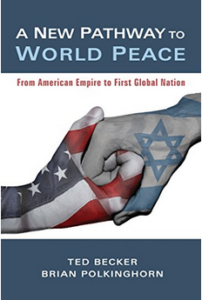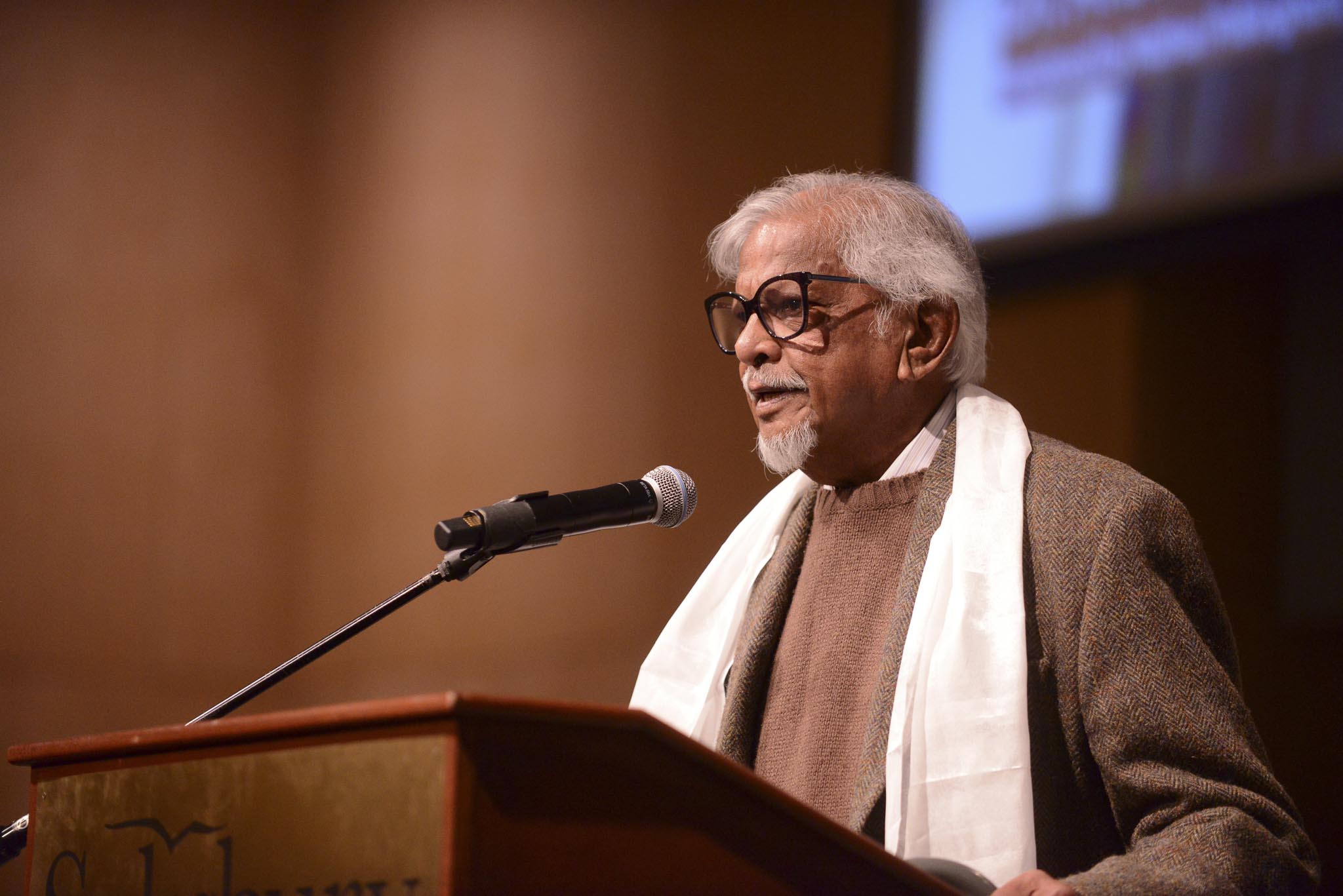A new book co-authored by the Bosserman Center for Conflict Resolution, Dr. Brian Polkinghorn!

Horrific changes are descending upon humanity, most of them man-made, all of them threatening the survival of humankind on Mother Earth.
Forever wars, the threat of nuclear destruction, the ecology collapsing worldwide, swelling waves of migrants, and unprecedented global inequality of wealth are upon us. The dominant, modern worldview prevailing for many centuries has produced all the above and needs swift and radical change.
Central to this unfolding tragedy stands the United States, boasting its “exceptionality.” Alexis de Tocqueville’s Democracy in America coined and defined how America was an “exceptional” nation. However, the America he lauded in the early 1800s and what it has become today are as different as Antarctica and Hawai’i.
This book is designed to pry open the eyes and minds of people everywhere about the true nature of the US as a spiritual and political (but not militaristic) nation, one to emulate and with whom to collaborate on helping resolve the violence and myopia plaguing humankind right now.
It illuminates a new way to reshape American thinking, and that of the whole world, sensibly and with sensitivity to all humanity and the planet itself. But you must read to the last word to absorb the entire vision.
“Dator’s Second Law of the Futures states that ‘any useful idea about the futures should appear to be ridiculous.’ Every aspect of the proposal of this book–that Israel become the fifty-first State of the United States–seems preposterous in the extreme. Therefore, I sincerely recommend it to you. Like many other ridiculous ideas that turned out to be ‘obvious’ in the futures, this might be a big one indeed.”
–Jim Dator, Futures Studies, University of Hawaii
“Authors Ted Becker and Brian Polkingham propose a provocative interest-based approach to resolving one of the most entrenched conflicts in human history–the divisive rancor in the Middle East. Identifying common core, or underlying, interests such as survival, existence, identity, boundaries, peace and security, enjoyment of life, and productivity, they synthesize positive components of American Exceptionalism and Manifest Destiny to fashion a pragmatic, mutually beneficial resolution for Israel, her prospectively collaborative neighbors, the USA and, consequentially, the globe.”
— C. Kevin Coonrod, Ombudsman, Auburn University
Ted Becker was the first Walter Meyer Professor of Law at NYU School of Law and is Chair and Professor Emeritus at the University of Hawaii and Chair and Alma Holladay Professor Emeritus at Auburn University. He is the author of fifteen books.
Brian Polkinghorn is a Distinguished Professor of Conflict Analysis and Dispute Resolution and the Executive Director of the Bosserman Center for Conflict Resolution at Salisbury University. He is a renowned international mediator and a Fulbright Ambassador.
Featured Review:
Review by John Rensenbrink
This book may well alter the terms of future discussions and debates about the constricted complexities of the Israel/Palestine/Mid-Eastern theater of false turns. Its authors, Ted Becker and Brian Polkinghorn, present an arresting idea. For most of us, initially, their call for Israel to become the 51st state of the United States (and then the District of Columbia and Puerto Rico) will seem a bit crazy, far flung, a gilded fantasy, or just plain beside the point.
But then we might re-think our reaction should we actually sit down to read it. For one thing, you and I dear reader know by now, after years and years of listening to experts, pundits, politicians, diplomats, presidents, military leaders, prophets, and fellow citizens, that there has been a plethora of solutions advanced by a plethora of people—none of which have proved feasible, or if feasible, acceptable. Maybe one more solution, and one that is totally un-orthodox, and sounding sufficiently off-beat, should be picked up. That is my first thought, that the book should at least be read. Since no solution has been found, or even gotten any promising follow through in real life, why not look at this one? The protagonists in the conflict may well have reached what the authors, with their background in mediation processes, call “a conflict fatigue point,” (CFP) such that they, the protagonists, may be ready at last to listen to a new way of thinking and action.
My second thought goes further. Whatever you might think of the idea as such, you will have to admit, once you start reading, that the book is done with considerable, maybe even unbelievable, attention (a) to the nitty gritty of the situation itself (b) to the clarification of policy, strategies, and the forces posed in opposition to one another, and (c) to the weight of the arguments in favor of Israel joining the Unites States (and vice versa) as one of 51 united states. In this latter case, you will note that they do not shy away from identifying, with almost embarrassing candor, the reasons why their proposal necessarily faces immense objections and immense resistance from embattled quarters.
At the very beginning, the authors introduce themselves. They explain convincingly that they have the background of knowledge and experience, both in historical fact and in conflict resolution, that enables them to write with confidence and scholarly authority about their idea.
The First 100 Years or so of America’s Expansion
The first part of the book is replete with efforts on their part to show that the United States does have (or did for over 100 years have) the history, the character and the kind of expansion methodology to embrace, as a new state, the state of Israel. They illustrate it and sum it up, pp. 90-97, by recalling five case studies of expansion that involved, not conquest, but sometimes very thorny state by state admission into the union: Vermont, Texas, Utah’s Mormon state, Alaska and Hawai’i. The last two, being non-contiguous, offer further precedent for Israel’s joining the union. This kind of expansion is authentically “American exceptionalism”, they argue, further filling out the argument by citing the grounding of the growing country in the mores and theologies of practical and practiced religion, especially Christianity. It was largely in these terms, they aver, that America’s unique expansion took place. For the first one hundred years or so of the new country, this was the principal methodology of expansion.
A Problem
But here is their problem. It looms large in their effort to persuade us that America can continue to expand in those terms. For the past 100 years, a different methodology has arisen and is now flourishing. It started full scale with McKinley at the close of the 19th century. Since then what has gripped the American ruling cohorts (and then class) is the methodology of imperialism. The religious roots and moral roots thereof have faded away. Voices for imperial splendor and expansion, increasingly secular and strident (and amoral), have grown decade by decade.
The authors cite a skein of influential imperialist thinkers: Alfred Thayer Mahan (1840-1914), Halford John Mackinder (1861-1945), an enormously influential Britisher (1861-1945), and Nicolaus John Spykman (1893-1943). Building on the work of these thinkers, the acme of the imperialist surge and takeover was the rise of Dick Cheney, Donald Rumsfeld, and the neo-cons at the end of the 20th century. Pushing farther than ever the nakedly amoral geopolitical imperialist agenda and un-manifest destiny of America (preaching a militaristic brand of American exceptionalism), they announced and promoted a “muscular, nuclear-tipped empire,” which they dubbed “The Project for a New American Century.” (PNAC). They created PNAC in 1997 and catapulted into power with the election of George W. Bush in 2000.
The authors are devastating in their rejection and critique of the hawkish imperialist takeover backed as it is by a global corporate ascendant oligarchy. They see it as the exact opposite of the earlier idea of the United State as an ever expanding nation believed by many pioneers to be God’s will. “The American Empire,” they write (p. 24) “has become analogous to a widespread bacterial infection on the world body politic.” A few pages later (p. 28) they write, “Americans need to regain control of their government and get it to abandon ‘The American Empire.’” They seem to be saying that this (what would be a basic change of revolutionary proportions) is a crucial pre-condition for Israel to be able join the United States as its 51st member-state. But they also predict that “The American Empire” is faltering and will collapse, much sooner than expected. They point out that the march of things is towards a multi-polar world. Just exactly how a multi-polar world and a re-invented America as “an ever expanding nation” (p. 15) would cohere—this signals some further food for thought, I would think.
Israel and its Neighbors: Positions Versus Core Interests
Becker and Polkinghorn base a good part of their analysis of the Middle East quagmire—on the need to do something the nations involved have failed to do. It is imperative for the protagonists to make a clear distinction between “position” and “interests” (especially core interests). If they with awareness were to do this, they would locate their core interests more clearly and readily and find, lo and behold, lots of common ground. Failure to do so condemns them to remaining stand-pat in their fears, resentments and motives of revenge. Whether the reader will in every case agree with the authors’ assessments of what each nation’s core interests actually are, they, the authors, offer enough to indicate that this is a promising departure from the usual and tiresomely repeated postures, position-thumping, and rhetoric of blame.
Whether, however, attention and focus on “core interests” would or could lead to energy within Israel to become the 51st state; or whether a resolute focus on their core interests by Israel’s neighbors would lead them to accept Israel as a member-state of the United States, these things are very problematic.
According to the authors, a discovery of its core interests by Israel would reveal at least these three point s: a deep concern about the alarming degree to which Israel is becoming an international pariah; taking due stock of the relatively diminishing role of the United States as the world powerhouse which can only mean a diminishing security for Israel overall in the years and decades ahead; and the rising agitation for fair representation in the Israeli government by increasingly self-conscious and courageous Palestinians whose homeland is Israel. On this latter point the Israeli government will have to take more and more into account the often ignored fact that a full quarter of Israel’s population is non-Jewish, a number definitely on the increase. Such “inconvenient facts” can also be seen as opportunities, if drawn on effectively, that could extricate Israel from the no-exit bind that threatens ominously. As one reads the book, one also finds similar “facts as opportunities” that are latent if not directly present for all of Israel’s neighbors.
I have long agreed with those who advocate for the “single state” solution.
Maybe by stimulating more dialogue of the kind Becker and Polkinghorn are promoting—dialogue that focuses on core interests–possibly this will make a single state solution (but only as part of the U.S.A., with all its constitutional rights) seem more and more feasible and attractive. That in turn might even lead to serious consideration by Palestinians of such an unorthodox solution as that advanced by the authors of this book.
Becker and Polkinghorn title their book “A New Pathway to World Peace.” They are ambitious for the people of Israel and the peoples of Israel’s neighbors. They see that the sorrowful plight of all–of their own making, to be sure, and yet not of their own making– is bound up with the fate of the world as a whole. It is also bound up so very intimately with what happens in and with the United States. Being of an optimistic turn, laced with deep realism, they offer us—they push us towards!– a way to think outside the box, that, in spite of all, the peoples of the world can learn and find a way to live together on this great planet in peace and with plenty for all. The struggles of Israel and its neighbors are a test case, if not in fact, THE test case.





